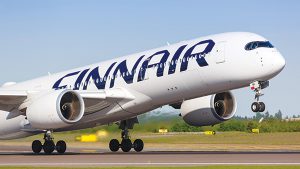Bloomberg
Finnair Oyj, the hardest-hit among European airlines from the closing of Russian airspace, is planning an overhaul of its strategy that would see a smaller operation pivoting westward.
“As a first step, the first response when we are reviewing our strategy on the back of the Russian airspace closure, we have pivoted our network to the west, and we are also increasing routes in Southeast Asia,†Chief Executive Officer Topi Manner said in an interview at the carrier’s headquarters near the Helsinki-Vantaa airport.
“We cannot wait for the Russian airspace to be opened,†he said. “We need to adapt to this situation and we need to change the company.†Finland’s national carrier is reeling from a double whammy: first its Asia-reliant business suffered a worse blow than many of its peers from the pandemic, and in February the ban on using the Russian airspace left its strategy in tatters. It had carved out a niche providing transit passengers from smaller European cities the shortest flight times to Asia. But the flights through its Helsinki hub to destinations like Hong Kong, Seoul and Shanghai relied on access to Siberian airspace. Finnair now plans to pivot its network towards the US, including cities such as Dallas and Seattle, while also adding routes to south and Southeast Asia, most prominently India. Helsinki is set to remain its hub.
“It makes sense to fly from Delhi or Mumbai via Helsinki to places like New York, Chicago, Seattle and Los Angeles,†Manner said. “Those connecting flows and the network logic will still be important for our business.â€
“Thailand works well too, and so does Singapore, especially because of the Australian traffic,†he said. “So in Southeast Asia, potentially also in the Middle East, we might have new opportunities.â€
While new routes will help mitigate the hit from the Asian flights Finnair can no longer profitably operate, they cannot completely replace the lost Asian traffic, the CEO said, adding that “we will need to resize the company when we review the strategy.†Resizing Finnair will mean flights at 70% of its capacity during the summer and leasing out 10% of its aircraft and crew capacity to Deutsche Lufthansa and IAG’s British Airways, helped by a renewed demand in Europe.
Finnair has remained independent amid years of consolidation in the aviation industry.
 The Gulf Time Newspaper One of the finest business newspapers in the UAE brought to you by our professional writers and editors.
The Gulf Time Newspaper One of the finest business newspapers in the UAE brought to you by our professional writers and editors.
